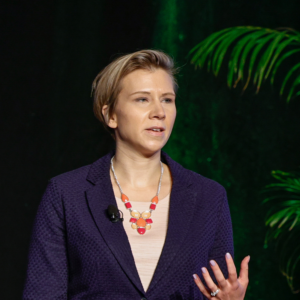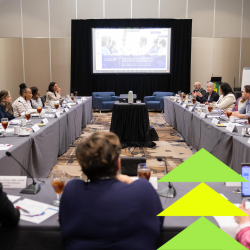In any category of job, you just know that some brand new employees are going to bail out the moment things start getting too hot in the kitchen, but any study coordinator who has persevered at their duties because they truly love clinical research will tell you that the challenges never stop coming. Different types of study hurdles to be overcome will evolve, diminish, or intensify over time, but waiting for the day on which they will have all dwindled to nothing is like waiting for the proverbial train that is never coming to your station.
Several speakers at ACRP 2022’s Monday morning (April 25) sessions assured their audiences that the hard times can be endured and that valuable lessons can be learned from them for planning, launching, and maintaining clinical trials through to completion.
Amber Brandolino, MS, CCRC, a clinical research coordinator (CRC), and Krissa Packard, MS, ACRP-CP, CRA, a research program director, both at the Medical College of Wisconsin, shared their experiences with getting through the public health crisis presented by the pandemic, saying the changes it forced upon their organization can help it be more prepared for future emergency situations.
“We really didn’t have a tool readily available to help us” continue the institution’s ongoing studies or eventually get those that were interrupted back on track, Packard said. “A lot was happening in a very short amount of time” after staff were told to start working from home on March 13, 2020—the same day the first case of COVID-19 was reported in Milwaukee, home of the college, she noted.
Before the pandemic, they “didn’t think about the fact that patients didn’t really need to [come onsite] all the time” for every type of study activity, Packard said. Safety for both patients and study staff was paramount as decisions about many changes to study routines were made and the pandemic stretched out, she added.
The “Clinical Research Reactivation Worksheet” developed at the college from out of the COVID-19 challenges “really helped us prioritize our research in the reactivation phase,” Packard said.
The worksheet is like a silver lining that “gives meaning to the work of what we all went through” in the pandemic, Brandolino added, saying that it can be thought of as the fire extinguisher in the glass box that you hope you will never need to use but are glad to have when a fire breaks out.
In a separate session, a trio of professionals from Nationwide Children’s Hospital focused on how the challenges presented by high CRC turnover levels in a major study involving their institution have led to strategies for ensuring coordinator support, maximizing study product and organization, building teams, and managing trainings and meetings. The clinical research program manager and team lead for Clinical Research Services at Nationwide is Corinna Bowers, BSBA, CCRC.
The speakers’ hospital is part of a 10-year study funded by the National Institutes of Health, and oversees 33 study sites involved in the research. In 2021 alone, those sites lost 28 staff while 26 new ones (in aggregate) joined. They estimated that an average of 24.5 days is needed for study-specific training for each study team member, not to mention other types of training and onboarding time for new hires.
“Coordinator turnover has been a very pervasive problem for us over the past 10 years,” and this was the case even before COVID-19 hit, said Samantha Sharpe, MD, a clinical research program coordinator. With remote work being so standard now, she added that a mentor/mentee program and consistently timed calls with CRCs at the 33 sites are among the tactics being used to keep them engaged in the long-term study.
In such complicated situations as a multi-institutional study, Mary Dreher, MPH, CCRP, also a clinical research program coordinator, advocated for the use of Smartsheets for tracking details on study financials, retention, training, and monitoring; checklists for patient visits and coordinator transitions; standardized documents/forms for participant cohorts, study withdrawals, and onboarding/offboarding staff; and standard processes for lab manuals, enrollment eligibility, and designating patients as Lost To Follow Up.
Author: Gary Cramer



